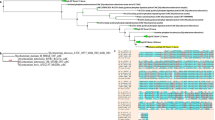Abstract
Heat-shock protein 70 (HSP70) is highly expressed in Toxoplasma gondii-infected cells. However, the role of this protein is not well understood, especially during apoptosis. This study addresses the mechanism behind the antiapoptotic chaperone activity of HSP70 in Toxoplasma-infected host cells using a human macrophage cell line, THP-1 by Western blot, DNA fragmentation assay, immunoprecipitation, and a caspase-3/7 activity assay based on cleavage of the colorimetric substrate DEVD-pNA. Apoptosis induced by arsenic trioxide (As2O3) was inhibited in T. gondii-infected THP-1 cells, but not in uninfected cells. Without As2O3 induction of apoptosis, T. gondii infection caused increased expression of Bcl-2 and HSP70, but not caspase-3. However, active form caspase-3 levels were lower in As2O3-treated infected cells as compared with As2O3-treated uninfected cells. Bcl-2 expression in As2O3-treated infected cells was similar to that in cells infected with T. gondii. Translocation of apoptosis-inducing factor (AIF) and release of cytochrome c from mitochondria were inhibited in As2O3-treated infected cells as compared with As2O3-treated uninfected cells. Increased parasite loads in Toxoplasma-infected macrophages caused higher HSP70 and Bcl-2 expression in whole-cell extracts and fractionated components, respectively. However, expression of AIF and cytochrome c was unaffected. Toxoplasma dose-dependently inhibited caspase-3 activation, thus revealing an anti-apoptotic parasite activity on cytochrome c-mediated caspase activation in subcellular components. In addition, immunoprecipitation analysis suggested that HSP70 is capable of binding to the pro-apoptotic factors AIF and Apaf-1, but not to cytochrome c or procaspase-9. Taken together, these data demonstrate that T. gondii infection inhibits mitochondrial apoptosis through overproduction of anti-apoptotic Bcl-2 as well as HSP70, which are increased parasite loads dependently.






Similar content being viewed by others
References
Carmen JC, Hardi L, Sinai AP (2006) Toxoplasma gondii inhibits ultraviolet light-induced apoptosis through multiple interactions with the mitochondrion-dependent programmed cell death pathway. Cell Microbiol 8:301–315
Didelot C, Schmitt E, Brunet M, Maingret L, Parcellier A, Garrido C (2006) Heat shock proteins: endogenous modulators of apoptotic cell death. Handb Exp Pharmacol 172:171–198
Fang H, Mun HS, Kikumura A, Sayama Y, Norose K, Yano A, Aosai F (2008) Toxoplasma gondii-derived heat shock protein 70 induces lethal anaphylactic reaction through activation of cytosolic phospholipase A2 and platelet-activating factor via Toll-like receptor 4/myeloid differentiation factor 88. Microbiol Immunol 52:366–374
Garrido C, Bruey JM, Fromentin A, Hammann A, Arrigo AP, Solary E (1999) HSP27 inhibits cytochrome c-dependent activation of procaspase-9. FASEB J 13:2061–2070
Goebel S, Gross U, Lüder CG (2001) Inhibition of host cell apoptosis by Toxoplasma gondii is accompanied by reduced activation of the caspase cascade and alterations of poly(ADP-ribose) polymerase expression. J Cell Sci 114:3495–3505
Guzhova I, Margulis B (2006) Hsp70 chaperone as a survival factor in cell pathology. Int Rev Cytol 254:101–149
Hippe D, Weber A, Zhou L, Chang DC, Häcker G, Lüder CG (2009) Toxoplasma gondii infection confers resistance against BimS-induced apoptosis by preventing the activation and mitochondrial targeting of pro-apoptotic Bax. J Cell Sci 122:3511–3521
Kabbage M, Dickman MB (2008) The BAG proteins: a ubiquitous family of chaperone regulators. Cell Mol Life Sci 65:1390–1402
Keller P, Schaumburg F, Fischer SF, Hacker G, Gross U, Luder CG (2006) Direct inhibition of cytochrome c-induced caspase activation in vitro by Toxoplasma gondii reveals novel mechanisms of interference with host cell apoptosis. FEMS Microbiol Lett 258:312–319
Kroemer G (2003) Mitochondrial control of apoptosis: an introduction. Biochem Biophys Res Commun 304:433–435
Laliberté J, Carruthers VB (2008) Host cell manipulation by the human pathogen Toxoplasma gondii. Cell Mol Life Sci 65:1900–1915
Lemarie A, Morzadec C, Merino D, Micheau O, Fardel O, Vernhet L (2006) Arsenic trioxide induces apoptosis of human monocytes during macrophagic differentiation through nuclear factor-kappaB-related survival pathway down-regulation. J Pharmacol Exp Ther 316:304–314
Miller WH Jr, Schipper HM, Lee JS, Singer J, Waxman S (2002) Mechanisms of action of arsenic trioxide. Cancer Res 62:3893–3903
Mohamed RM, Aosai F, Chen M, Mun HS, Norose K, Belal US, Piao LX, Yano A (2003) Induction of protective immunity by DNA vaccination with Toxoplasma gondii HSP70, HSP30 and SAG1 genes. Vaccine 21:2852–2861
Mordue DG, Monroy F, La Regina M, Dinarello CA, Sibley LD (2001) Acute toxoplasmosis leads to lethal overproduction of Th1 cytokines. J Immunol 167:4574–4584
Pradelli LA, Bénéteau M, Ricci JE (2010) Mitochondrial control of caspase-dependent and -independent cell death. Cell Mol Life Sci 67(10):1589–1597. doi:0.1007/s00018-010-0285-y
Scorrano L, Korsmeyer SJ (2003) Mechanisms of cytochrome c release by proapoptotic BCL-2 family members. Biochem Biophys Res Commun 304:437–444
Sordet O, Rebe C, Leroy I, Bruey JM, Garrido C, Miguet C, Lizard G, Plenchette S, Corcos L, Solary E (2001) Mitochondria-targeting drugs arsenic trioxide and lonidamine bypass the resistance of TPA-differentiated leukemic cells to apoptosis. Blood 97:3931–3940
Wang C, Youle RJ (2009) The role of mitochondria in apoptosis. Annu Rev Genet 43:95–118
Weiss LM, Kim K (2007) Toxoplasma gondii. Academic, London
Yenari MA, Liu J, Zheng Z, Vexler ZS, Lee JE, Giffard RG (2005) Antiapoptotic and anti-inflammatory mechanisms of heat-shock protein protection. Ann NY Acad Sci 1053:74–83
Acknowledgements
This work was supported by National Research Foundation of Korea Grant funded by the Korean Government (KRF-2008-314-E00070-7644), and by a Basic Science Research Program through the National Research Foundation of Korea funded by the Ministry of Education, Science, and Technology (R13-2007-020-00000-0).
Author information
Authors and Affiliations
Corresponding author
Additional information
First co-authors: Il-Young Hwang, Juan Hua Quan, and Myoung-Hee Ahn
Rights and permissions
About this article
Cite this article
Hwang, IY., Quan, J.H., Ahn, MH. et al. Toxoplasma gondii infection inhibits the mitochondrial apoptosis through induction of Bcl-2 and HSP70. Parasitol Res 107, 1313–1321 (2010). https://doi.org/10.1007/s00436-010-1999-3
Received:
Accepted:
Published:
Issue Date:
DOI: https://doi.org/10.1007/s00436-010-1999-3




